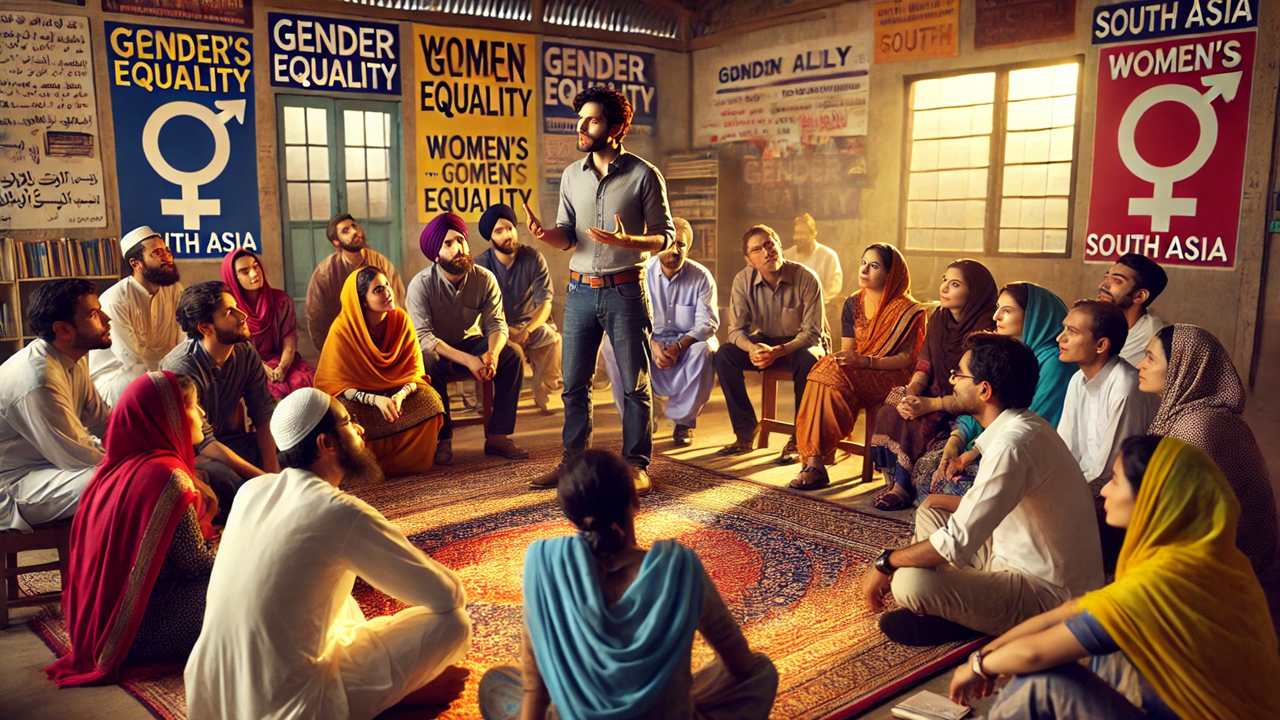Transforming Masculinities: Engaging Men for Gender Equality in South Asia
This report examines the critical role of men in gender equality efforts in South Asia. It explores how masculinity is socially constructed, highlights effective interventions, and provides recommendations for sustainable gender transformation.

A New Approach to Gender Equality: Engaging Men and Boys
A groundbreaking report, Engaging Men and Transforming Masculinities to Achieve Gender Equality and Women’s Empowerment: A Stocktaking of Initiatives in South Asia, published by the Asian Development Bank (ADB), sheds light on the critical role men play in dismantling entrenched patriarchal norms. This report explores how masculinity is socially constructed and highlights transformative strategies to create a more equitable society.
The Role of Masculinity in Gender Inequality
The concept of masculinity is often associated with authority, dominance, and economic responsibility. Deeply ingrained societal norms perpetuate these beliefs, shaping gender roles that sustain inequality. The report underscores that engaging men in gender-transformative work is essential in addressing power imbalances and fostering women’s empowerment.
South Asia, a region where patriarchal traditions remain strong, faces persistent gender disparities, including high rates of gender-based violence and limited economic opportunities for women. The report explores how traditional masculinity intersects with caste, class, ethnicity, and religion, influencing men’s roles and their participation in gender equity efforts.
Strategies for Gender Transformation
To address these deeply rooted issues, various initiatives across South Asia have adopted gender-transformative approaches. These include:
Community-Based Programs: Grassroots interventions that engage men through peer education, mentorship, and participatory dialogues.
Education and Awareness Campaigns: School-based initiatives designed to challenge gender norms from an early age.
Media and Advocacy Efforts: Leveraging storytelling, films, and digital platforms to reshape societal perceptions of masculinity.
Policy Reform and Institutional Change: Encouraging governments and workplaces to integrate gender-transformative policies into mainstream governance.
Case Studies of Change
The report highlights successful programs across South Asia, demonstrating the tangible impact of engaging men in gender equality work:
India: The Men Against Violence and Abuse (MAVA) and Parivartan programs promote gender-sensitive conversations through mentorship and sports-based interventions.
Pakistan: Collaborations with religious leaders help dismantle harmful gender norms and foster discussions on shared gender responsibilities.
Bangladesh: Programs integrating male participation in family planning and domestic violence prevention show promising results.
Nepal & Sri Lanka: Male advocates and community leaders actively promote gender justice through local dialogue forums.
Challenges and Resistance
Despite progress, several challenges persist. Societal resistance to shifting gender norms remains a significant hurdle, with some men perceiving gender equality as a threat to their traditional roles. Financial constraints also hinder the sustainability of gender-transformative programs. Moreover, measuring behavioral changes and long-term impact remains a challenge in assessing the effectiveness of these initiatives.
Moving Forward: Recommendations for Sustainable Change
The report calls for a multi-pronged approach to accelerate progress:
Scaling Up Successful Programs: Expanding initiatives to reach broader populations.
Strengthening Policy Frameworks: Implementing gender-responsive laws and education reforms.
Encouraging Multi-Sector Collaboration: Engaging NGOs, governments, the private sector, and media in gender-transformative work.
Ensuring Long-Term Commitment: Moving beyond short-term campaigns to sustainable interventions that reshape societal structures.
Enhancing Monitoring and Evaluation: Developing robust frameworks to measure change and refine strategies accordingly.
The report Engaging Men and Transforming Masculinities to Achieve Gender Equality and Women’s Empowerment, published by the Asian Development Bank (ADB), emphasizes that gender equality is not solely a women’s issue but a societal responsibility. By actively involving men in the conversation and challenging restrictive gender norms, South Asia can take significant strides toward a more just and inclusive future.
- FIRST PUBLISHED IN:
- Devdiscourse










